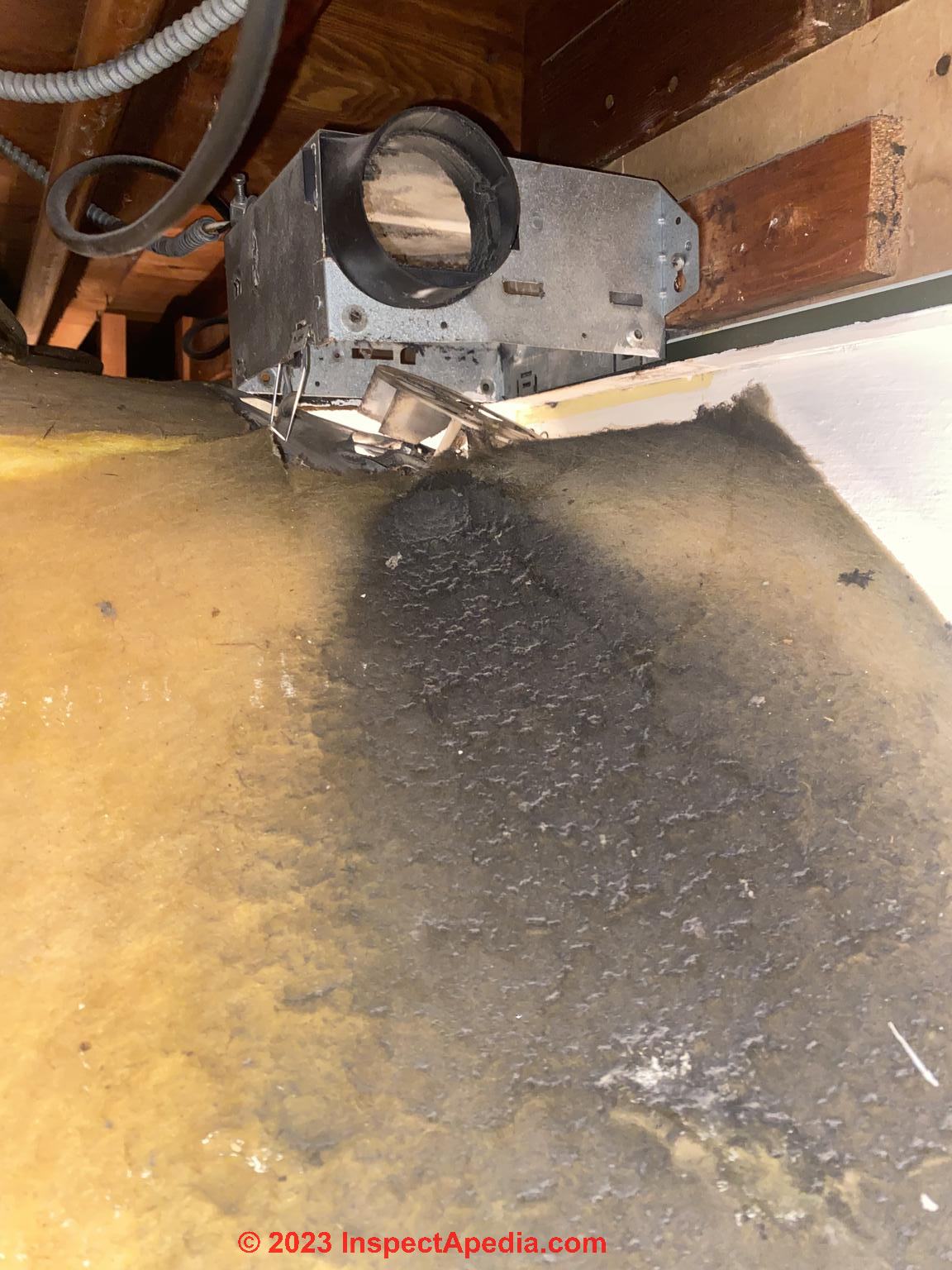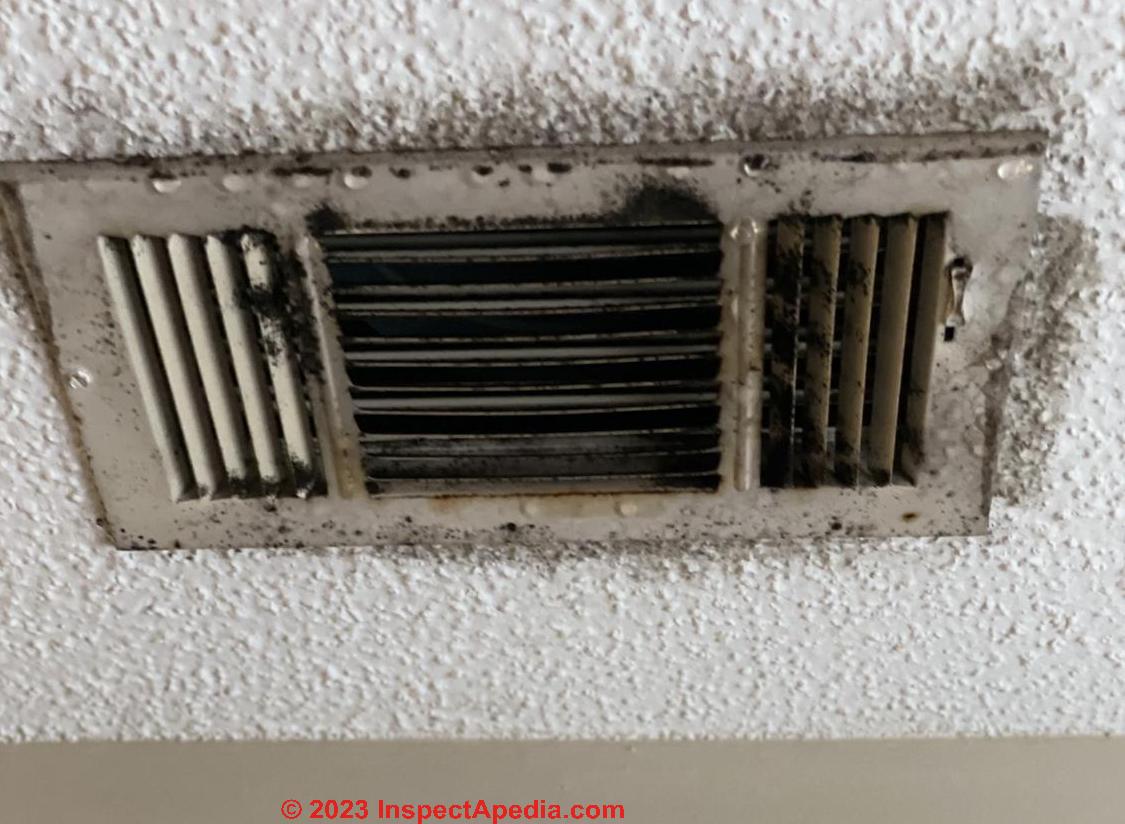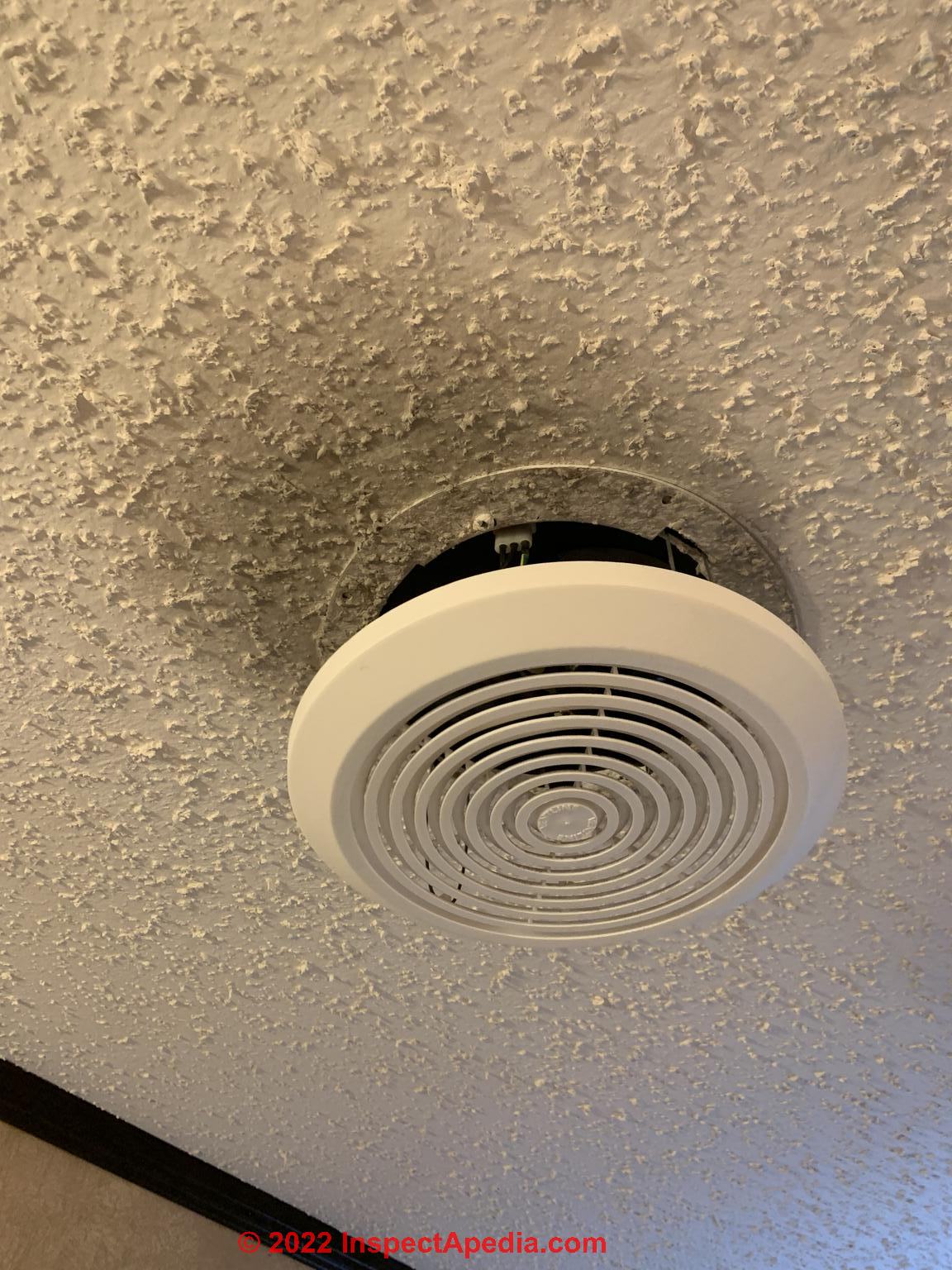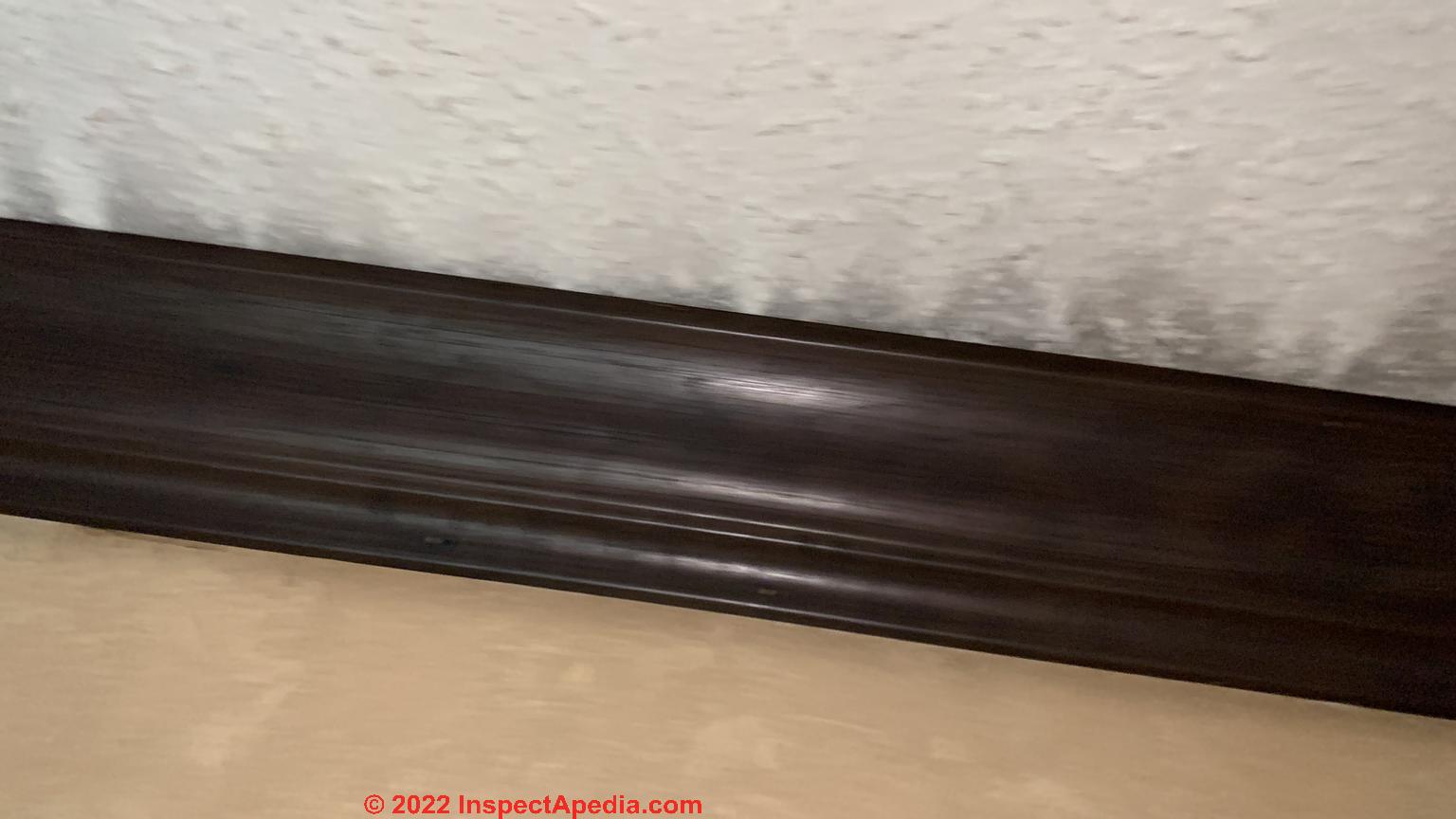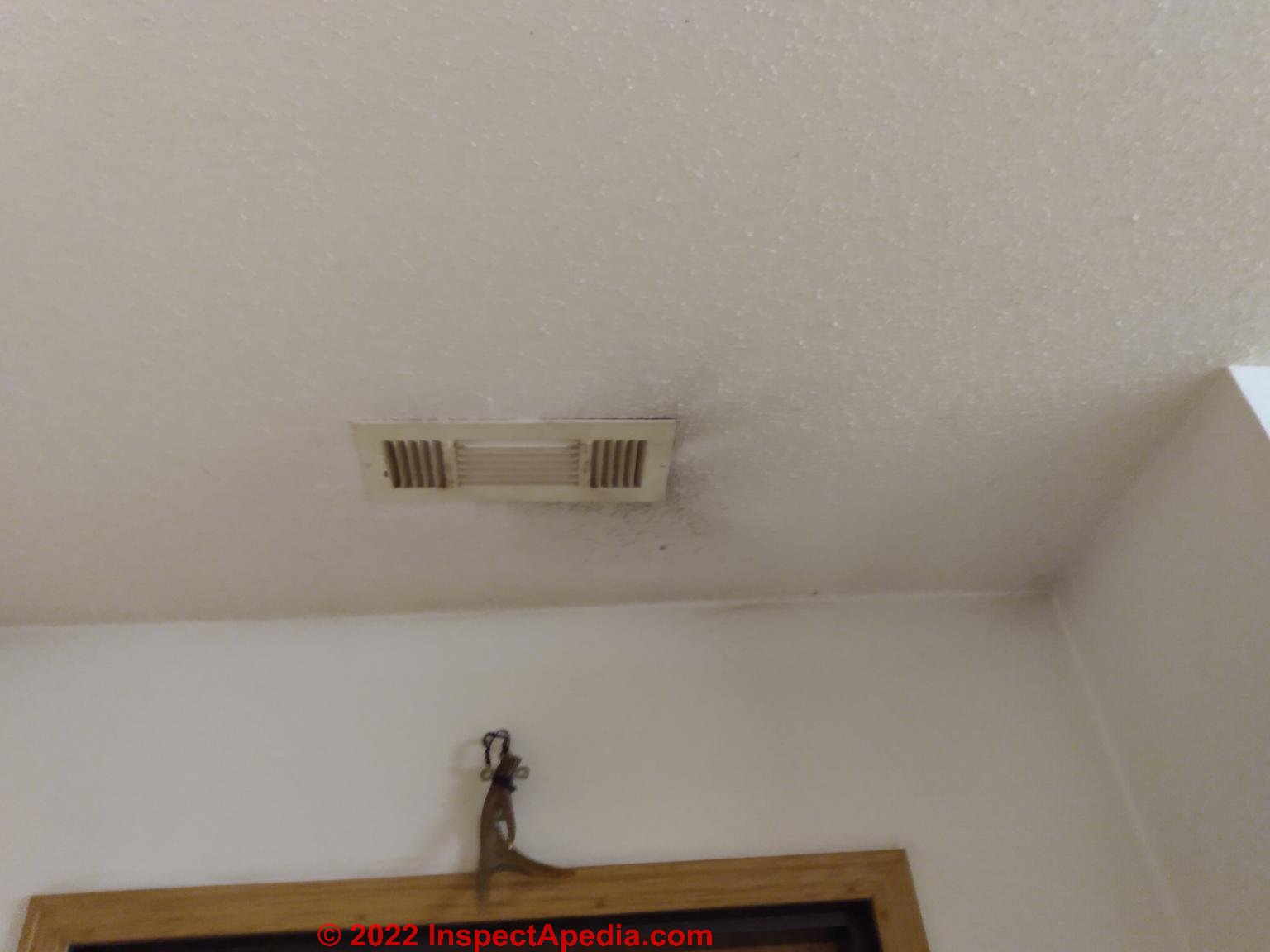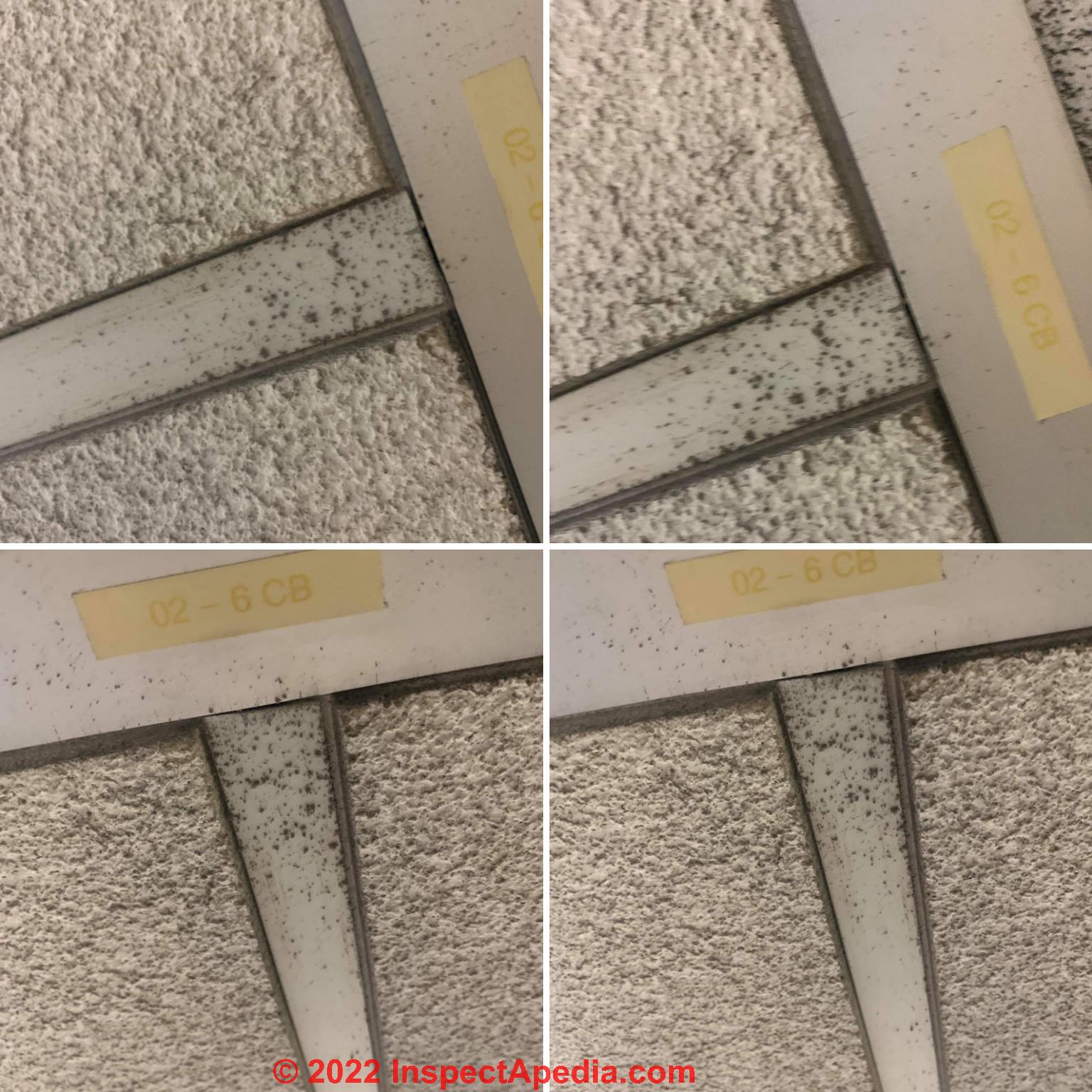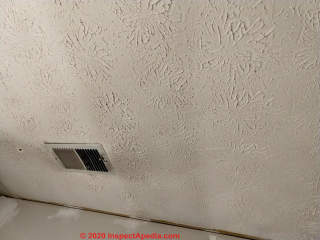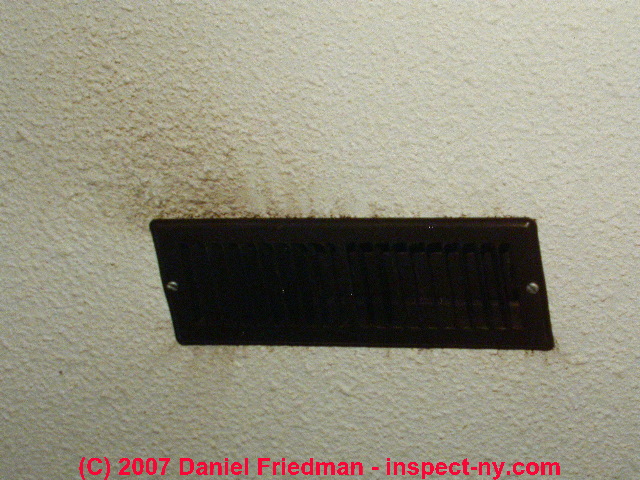 HVAC Dust or Soot Stain FAQs
HVAC Dust or Soot Stain FAQs
Q&A on How to Diagnose Indoor Wall or Ceiling Stains
on building surfaces near air supply or return registers or
at HVAC ductwork
- POST a QUESTION or COMMENT about wall or ceiling stains that are traced to heating system problems
Questions and answers about the cause, prevention, and hazards of soot stains found around the air supply registers and occasionally even air retur registers for heating and air conditioning ductwork systems.
This article series describes & diagnoses heating equipment as the cause of various interior wall and ceiling stains and explains how to recognize thermal tracking, thermal bridging stains, building air leaks, and building insulation defects.
Page top photo: rust and soot stains around a ceiling supply air register.
InspectAPedia tolerates no conflicts of interest. We have no relationship with advertisers, products, or services discussed at this website.
- Daniel Friedman, Publisher/Editor/Author - See WHO ARE WE?
Q&A on Ceiling / Wall Stains From Heating or A/C Systems
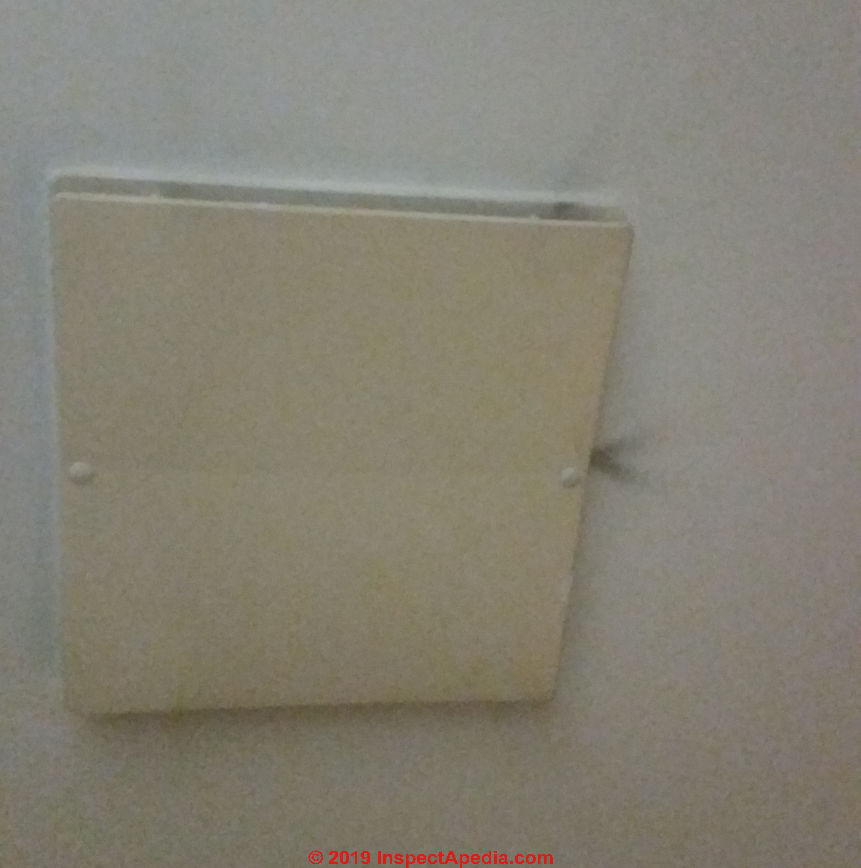 These questions & answers about indoor stains on ceilings and walls that are traced to heating or air conditioning systems or their ductwork were posted originally
These questions & answers about indoor stains on ceilings and walls that are traced to heating or air conditioning systems or their ductwork were posted originally
at STAINS HVAC SOOT or DUST - so please be sure to also review that article.
Window A/C Unit is spitting out black dust
My window AC works great - ice cold - but keeps spitting out pieces of black dust all over - filter is clean - any suggestions?
- epmmr@aol.com
by (mod) -
It sounds as if an internal plastic part may have deteriorated in your unit; use a flashlight to take a look into the A/C unit interior through both the supply louvers and (with the filter removed) the return air inlet.
If you are sure that the debris is coming from inside your unit, unless we can spot something simple like a piece of foam insulation in the air path or being impacted by the blower fan, I'm not optimistic about its remaining life.
See details at STAINS HVAC SOOT or DUST
Apartment bathroom exhaust fan blows just into the ceiling cavity and attic
Found out our apartment bathroom exhaust fan leads to nowhere, just the ceiling above us. Is there potential for mold in this?
On 2023-03-09 by Sc -
On 2023-03-11 by InspectApedia Editor - bathroom exhaust must be vented to the building exterior
@Sc,
Certainly blowing moist bathroom air into a building attic invites mold contamination and over a longer term, building damage.
Bath exhausts need to be vented to the building exterior.
Black stuff is clogging the air filters and coming out of our ceiling registers - it's not mold but what is it?
I live in these apartments and they are very old apartments in lately there has been Black stuff filling up mine filters two solid black and some of my carpet is black, all my air ventsHave black stuff running out of them. I was told that the black on the carpet and on the filter was not mold but what about the air vents? On 2022-08-26 by Deborah Moore
by InspectApedia-911 (mod) - black stains and water droplets on air register edges need investigation
@Deborah Moore,
Those deposits may be house dust or even soot from a heating system furnace, and it also looks as if there are water droplets on the register edges.
Those visual clues suggest that the HVAC system, air handler, and duct work may be very dirty, have not been maintained, need cleaning or repair/replacement (depending on the results of inspection), and that there is a risk of hidden mold contamination in the HVAC system as well as anywhere that condensate has dripped onto or wet ceiling drywall.
It would be appropriate to investigate further.
Watch out: First priority: if those ducts are supplying heated air from a gas-fueled furnace, there is a risk that the furnace and its burner are producing soot. If that's the case the heating system is very dangerous: when gas burners produce soot the immediate hazard is the production of dangerous, even fatal carbon monoxide.
MAKE CERTAIN, right away, that your apartment has working and properly located and tested smoke detectors AND carbon monoxide (CO) detectors.
And if there's apparent soot production, inform building management immediately, both orally and in writing that there is risk of dangerous or fatal carbon monoxide production requiring immediate inspection by a qualified, trained heating service technician.
Soot stains over my floor ducts and on ceiling have me worried
We have natural gas and water heater and recently I’ve had a buildup of soot right over my floor ducts and now on my ceiling perimeter in all my rooms.
I cleaned the ducts and thought that was the problem but the soot is covering my windows and curtains On 2022-08-09 by Dolores -
by InspectApedia-911 (mod) - buildup of soot is very dangerous
@Dolores,
Watch out: what you describe is very dangerous.
Gas burning equipment that is producing soot is not working correctly and there's a possibility that it's producing dangerous or even fatal carbon monoxide gas.
Therefore you should be sure that you have working carbon monoxide detectors properly located, installed, and tested,
and the best course of action would be to turn the heater off immediately.
Then you need to have it inspected and repaired by a trained gas service technician. Keep us posted.Show us a photo of the soot stains - often we can tell by the soot stain location and pattern just where its source may be and how dangerous it is.
by Dolores
A tech from SJ Gas came out and said that the patterns were indicative of soot from burning candles. My heater is off because we’re in the summer season. I’m still uncertain.
by InspectApedia-911 (mod) - candle soot pattern obvious on walls
@Dolores,
Well if your service technician is right, that means s/he didn't find an immediate life-safety hazard from your gas-fired heater.
Certainly if the stains appeared AFTER your heater was turned OFF then that suggests the heater is not the cause of the staining.
Soot stains from burning scented candles are indeed found in buildings and are easy to identify as those stains will be concentrated in the area where the candles were burned.
Read details at
THERMAL TRACKING BRIDGING GHOSTING - home
and at
STAINS CANDLES FIREPLACE WOODSTOVE
Candle soot stains are principally from burning scented candles, not other candles, unless you're burning a lot of them.
And see my example photo here where you see candle stains on a wall.
In contrast, if your soot stains are more uniform and more extensive in the building, as shown in the thermal tracking article, they are not from burning candles.
Soot shows up when I run the air conditioning
When I use my central AC I get black soot in my upstairs bedroom. My two returns are in the ceiling with a ceiling fan between them which goes all night long.
The blades of the fan are black on the upper sides and the carpet shows soot along the furniture directly below the ceiling fan.
This does not happen when my furnace is going only my AC. I feel this is related to the combination of the placement of AC returns and the placement of my ceiling fan directly in the middle going all night long. On 2022-07-02 by Roz -
Reply by InspectApedia (mod)
@Roz,
That sounds as if you need a careful and thorough on-site inspection of the HVAC system to find the problem such as mold in the ductwork, dirty ducts, or perhaps as you suggest, fan-disturbed dust that is not being adequately filtered by the system's air filter.
But FIRST be sure you have a new, clean air filter installed at the air handler.
Oil burner soot stains may indicate risk of puffback explosion in my rental home
Would construction in a basement where the boiler room and furnace were left unprotected and dirty lead to this happening on the walls and ceiling?
My landlord was converting basement to duplex and failed an inspection. He's been doing construction for 2.5 years. Fully redoing basement.
Boiler and mechanical room was needing to be cleaned via inspectors. He is saying I did this with candles but I hardly used them at all.
On 2022-06-22 by Chris -
Answer by InspectApedia (mod)
@Chris,
Thanks for the photos and a helpful thermal tracking question.
There is not a shadow of a doubt that we are seeing thermal tracking deposits from a particle or soot source far greater than would occur from burning scented candles. The most likely cause is just what you suggest: an oil burner that was releasing soot into building air.
In our article STAINS CANDLES FIREPLACE WOODSTOVE
we illustrate in photos the sort of stains that occur from burning scented candles. In every instance the stains will occur above, not below, the candle location, and will be close to the candle location.
In your photo the black thermal tracking stains originate low on the wall, just above the heating baseboard - a common source of such stains because of the convection currents caused by warm air rising from the baseboard heaters.
In your photos the black thermal tracking stains occur throughout the room across the length of walls, from floor to ceiling, and on the ceiling as well.
The only way that such stains might be ascribed to use of scented candles is in my opinion one that is not at all realistic:someone would have had to burn a great many such candles, to have placed them at floor level, to have distributed them uniformly around all of the walls of the room, and to have added additional scented candles at two or three heights up along the entire length of the walls and under the ceilings so as to produce an airborne soot level that was rather uniform in the room.
I estimate that one would have needed perhaps 100 or more such candles burned repeatedly or over long intervals. Frankly such a claim has no basis in the fact of the observations and stain patterns.
Watch out: it's common for a high volume of soot to be released repeatedly and over long intervals of inattention from an improperly operating or poorly adjusted oil burner. But the more serious risk is that continuing to use that oil burner without proper cleaning, tuning, adjustment, possibly needing also a chimney inspection, risks a dangerous puffback explosion.
See details at OIL BURNER SOOT & PUFFBACKS
Black ceiling stains around air supply register - caused by what?
Hi there, adding another image to the previous question I posted on dark stains on our ceilings - what's causing this?
On 2022-06-11 by peter -
Reply by InspectApedia-911 (mod) - round stain around register may be leak concern
@peter,
Do take a look at
THERMAL TRACKING BRIDGING GHOSTING - home
because those lines appear to follow ceiling joists.
The round stain around that supply register is suspicious: is this an A/C system supply register?
Has insulation been removed around it in the attic?
Have you checked the attic side of the drywall for condensate leaks or other leak stains and mold?
Diagnose these gray stains at a bathroom vent and on the wall near my stove
Vent in bathroom , doesn’t look like mold to me I’m lost for things this could be tho.? Maybe I’m wrong tho but I hope not hopefully can get an answer.
Thanks in advance
Also this greyish spot kinda on the left side of my stove it’s an electric stove it’s been there awhile no growth in the area , Just want to come up with an answer on this spots as well hopefully.
Thanks in advance
On 2022-02-08 by Austin Cade
Reply by Inspectapedia Com Moderator
@Austin Cade
What are we looking at? An air supply register?
Search InspectApedia.com using the on-page search box for GHOSTING THERMAL TRACKING STAINS to see details.
Those dark deposits are left by movement of air across the surface. It's not mold.But stains along the horizontal trim (at a wall-floor or wall-ceiling juncture) are (house dust deposited by air moving over the surface) in that location and pattern do tell us that there is air leakage.
Are dark stains around ceiling air register dangerous?
Look at these black spray-like stains at the air supply vent in my kitchen ceiling; what is this dark stuff? is it dangerous?
On 2021-12-20 by Gw Rosy -
Reply by Inspectapedia Com Moderator (mod) - in this case, yes, risking fatal CO poisoning or an explosion
@Gw Rosy,
That looks like sort of dirt blowing out of an air supply registers.
Watch out: if you are heat is from gas fuel that's an extremely dangerous situation as sitting from the gas heater that's getting into the house are suggest both and improper flame and potentially fatal carbon monoxide poisoning. If it's an oil burner there still may be a failed heat exchanger and suit getting into the building Air Supply.
You need to have the heating system inspected and repaired or replaced.
You also may need duct cleaning.
Be sure that you have working smoke detectors and carbon monoxide detectors properly located, installed, and tested.by gwrosy
@Inspectapedia Com Moderator, also is is a conventional type gas furnace.
it is a gas furnace on first floor townhome. it also makes abooming noise upon ignition. it is in a closet/its own room w gas hot water heater.
by Inspectapedia Com Moderator (mod)
@gwrosy,
Watch out: A booming or explosive noise at the time of ignition of a gas furnace could be something as simple as thermal expansion of ductwork or if it truly is at the moment of ignition of the burner it's more likely to be an ignition of an accumulated amount of gas.
That could be from a gas leak or an improperly adjusted burner but in any event this condition is quite unsafe.
That explosion risk combined with a production of dangerous or even fatal carbon monoxide gas by a malfunctioning gas heater is very dangerous.
That's why I warned you earlier to be sure that at the very least you had working and regularly tested smoke and carbon monoxide detectors throughout your home.
It's quite possible that a trained heating person at your home who saw the conditions that you describe would insist on turning off the system immediately for the safety of your family. He would red tag it meaning that it should not be turned on without repair or replacement.
I'm sorry as I know this is inconvenient but it's more convenient to be cold than to be fatally poisoned by carbon monoxide.
Black mould/ soot/house dust? our staff complain about itchy eyes, coughs, headaches - is it our A/C unit?
Can anyone tell me if they think this could be black mould/ soot. Employer says it's house dust
number of staff complain regularly itchy eyes, cough, headaches etc. Air con regularly leaks and boiler blew several months ago with water tank evaporating into steam
@inspectapedia.com.moderator, this is one of a few ceiling vents in an office in middle of building. We are told vents cleaned every 3 months
On 2021-10-22 by veganknitters -
On 2021-10-22 by inspectapedia.com.moderator (mod)
@veganknitters,
From that dotty pattern I think we're seeing a bit of mold growing on the surfaces - it'd be helpful to know what we're looking at: a ceiling, wall, or something else.
Total area is, of course, trivial but if there have been leaks or moisture traps it's worth further investigation.
Remove the mold
or remove moldy materials that can't be cleaned - and replace them
Inspect for hidden mold such as above the ceiling tiles and in nearby ductwork
Change / install new HVAC filters
Be sure water leaks are fixed
What's causing these black ceiling stains, smoke and creosote odors in my 1979 house?
We just moved into a "new" house (new to us, built in 1979).
The basement has an old cast iron wood stove (original to the house); the whole basement smelled strongly of smoke/creosote.
I wet-vacced the carpet and we're replacing the wood panels with sheetrock, and the smoke smell is almost gone.
Near the registers on the ceiling, you can see the soot marks you describe (hopefully it's just from the fires and they are not related to the 14-year-old oil furnace).
I was wondering if you had some idea why there would also be soot marks next to the register in a straight line across the ceiling between what I expect are the joists? On 2020-11-16
by Rachel
- 1
Reply by (mod) - causes of patterns of dark stains or soot deposition on building walls and ceilings?
Rachel
Thank you for a helpful question that I might re-phrase as
What are the causes of patterns of dark stains or soot deposition on building walls and ceilings?
at THERMAL TRACKING BRIDGING GHOSTING
You'll see that soot in that case is deposited along ceilings and walls where the presence or absence of insulation or wood framing members cause differences in
- surface temperature
- surface moisture
where more particles tend to bond to damp surfaces that often correlate with cooler surfaces indoors. That's because moisture in indoor air condenses out onto the surface at a faster or greater rate on cooler than on warm surfaces.
Besides moisture level and temperature differences in indoor surfaces soot or dust deposition is also affected by
- direction of air flow
- differences in surface texture
- variations other indoor air currents that affect the primary air flow direction such as out of an HVAC supply air register
In your photo we see quite clearly dark soot blowing parallel to the wall as directed by the bend in the individual louvers of the air supply register grille.
We also see dark lines in the ceiling that may mark an area of cooler ceiling.
The fact that the lines are so straight hints (I AM ONLY ABLE TO GUESS as I have no information about your building) that your photo may be showing a top floor ceiling below an attic AND there may be less, or disturbed, or leaky insulation above the darkened area.
Watch out: while a wood stove can indeed soot up a building interior, when we see black soot blowing out of the air register there are two common causes, listed in order of probability:
1. A heating furnace is unsafe, and operating improperly: producing soot and leaking combustion products out of the heat exchanger into the supply air plenum and thence through supply ducts into the building interior
Watch out: particularly if a furnace is gas fired there is a high risk of fatal carbon monoxide poisoning if the heater is producing soot.Watch out: Be sure, in any case, that you have working and properly installed smoke and CO (Carbon Monoxide) detectors in your home, and get your heater inspected for safety and proper operation right away.
2. Return air pick-up of soot: Occasionally we find a soot or dirt source near cold air returns in the heating system or leaks in return air ducts that pick up soot or debris from other sources and blow it through the HVAC system.For example a return air inlet that drew smoke out of your woodstove vent system might also blow it through the duct system.
3. Watch out: For completeness be sure your heating service company confirms that your oil furnace is working properly. If the sooting is comign from the oil furnace there's risk of both a bad heat exchanger (flue gas leaks into the home) or a dangerous explosion that we explain
at OIL BURNER SOOT & PUFFBACKS
I see soot everywhere - can't find the source
I recently had my air ducts cleaned in my 17 year old townhouse Once cleaned my filters are turning black and I am noticing soot everywhere I have had the company come back and they cannot find the source of the soot What do I do On 2020-10-28 by BettyGentile -
Answer by (mod) - how to find the source of black debris on air filter after duct cleaning
Betty
What is the material of your air ducts? If the duct interior is metal then those can be cleaned.
Air ducts made of flex duct or of fiberglass insulating board cannot be mechanically cleaned without risk of damage including shredding the duct insulation.
I can but guess, as I have no information about your HVAC system, that if your ducts were mechanically cleaned and damaged that could be a particle source.
Beyond that if no expert onsite can identify a soot or dust source and if that expert agrees that your filter material is an abnormal condition, then you might collect a tape sample of your filter dust to have analyzed by a forensic lab to identify the dominant particles.That will usually point to the source.
Watch out: see my warning to Lori given below.
We are seeing black soot all over the place
I have converted a storage shed into a tiny house for me and my husband. we have been seeing black soot like settlement on our bedding, pillows and other areas located around our sleeping area.
I'm not sure what to do or think what is causing it. what do I do as in like a process of elimination to fix this issue that has been ongoing for the last 2 weeks straight. I'm scared that its toxic and will harm us if this keeps up plorip796@gmail.com On 2019-12-14 by Lori P. -
Reply by (mod) - first rule out unsafe heating equipment right awat
Lori
Watch out: The immediate danger that we want to "rule out" is that there is an unsafe heating system in your home.
Risk: If your heat is by LP gas or natural gas, improper combustion can produce both soot and potentially fatal carbon monoxide gas.
Actions:1. Alarms: Be sure that you have properly-installed, located, and tested smoke alarms (fire alarms) and CO (carbon monoxide) detector(s) in your home
2. Heater check: If the burner is noisy, smelly, sooty, rumbling or if this is your fuel, Have your heating service tech confirm that the heater is working properly, or fix it
Risk: if your heat is provided by an oil burner (and furnace or boiler) then improper combustion can produce soot and there is some risk of a "puffback explosion" from un-burned heating oil in the combustion chamber.
Actions: if the burner is noisy, smelly, sooty, then turn it off and have it serviced promptly.
I need help with fixing ghosting soot stains on our walls and ceilings
I have done extensive search and read on the internet in regards to soot, ghosting on walls, etc. We bought our house a year ago, had black sooting stains above heat registers and ceilings and thermal tracking upstairs on walls and ceiling.
I spent a whole year washing the walls and ceiling with ECO-tps, then bought a good quality primer and paints (Ben Moore), and painted the whole house.
We changed the natural gas fireplace (direct vent) and furnace (all brand new)this past couple of months.
The room where the fireplace is located has black fine particles (like soot)on TV, computer screen, table, armoire,walls everything, even when I vaccuum.
The fireplace still emits an unpleasant odour (it has been used now about 80 hours since new).
The HVAC techn came , tested for carbon monoxyde (0 reading), looked inside the firebox, said everything is fine.
There is black fine particles on top of the box, he said that is paint residue from manufacturing, flaking off. I am really perplexed and upset, wondering what's going on.
The house was built in 1977, it is air tight. There is no humidity problems in the house. We do not have an air exchanger. We always open a window near where the fireplace is, and also one upstairs.On 2016-10-28 by Marie
Reply by (mod) -
Marie, I'm unclear which "firebox" was inspected as well as unclear why the HVAC tech focused on CO testing.
If your heating system uses gas fuel, of course, testing for CO is an extra safety step but higher priority is having working CO and smoke detectors properly located in the home. CO tests are unreliable as a simple change in building conditions can convert from no detected CO to dangerously high levels of CO later. All we know is that CO was not detected - at the time of the test.
About the ghosting problem, you've addressed cleaning, repainting, and perhaps some of the soot or dust particle sources. However even without a focused soot source such as a fireplace or defective heating system, normal house dust, increased in level by carpeting, pets, and some other activities, can produce enough particles to show up as ghosting.
Searching InspectApedia using the search box jon any of our pages or in the ARTICLE INDEXfind THERMAL TRACKING BRIDGING GHOSTING the home page for this topic, on which we've also researched and written quite a bit.
In that article series, of whichSTAINS HVAC SOOT or DUST is one, argues that in addition to dust particle sources, ghosting or thermal tracking shows up in buildings with
- poor or incomplete insulation
- high interior moisture levels
- air circulation patterns moving dust across cooler surfaces
The open windows in your home improve fireplace draft (though an outside air source dedicated to the fireplace and an enclosed fireplace with glass doors would be more efficient) but they also increase air movement and updrafting.
As you haven't posed a specific question I offer the above to help out; after reading our article series don't hesitate to ask if that material seems unclear, incomplete, or leaves you with more questions. Working together will make us smarter.
Daniel
...
...
Continue reading at STAINS HVAC SOOT or DUST - topic home, or select a topic from the closely-related articles below, or see the complete ARTICLE INDEX.
Or see these
Recommended Articles
- OIL BURNER SOOT & PUFFBACKS
- STAINS at HVAC REGISTERS
- STAINS on INDOOR SURFACES, PHOTO GUIDE
- THERMAL TRACKING BRIDGING GHOSTING
Suggested citation for this web page
STAINS HVAC SOOT or DUST FAQs at InspectApedia.com - online encyclopedia of building & environmental inspection, testing, diagnosis, repair, & problem prevention advice.
Or see this
INDEX to RELATED ARTICLES: ARTICLE INDEX to BUILDING STAINS
Or use the SEARCH BOX found below to Ask a Question or Search InspectApedia
Ask a Question or Search InspectApedia
Questions & answers or comments about wall or ceiling stains that are traced to heating system problems.
Try the search box just below, or if you prefer, post a question or comment in the Comments box below and we will respond promptly.
Search the InspectApedia website
Note: appearance of your Comment below may be delayed: if your comment contains an image, photograph, web link, or text that looks to the software as if it might be a web link, your posting will appear after it has been approved by a moderator. Apologies for the delay.
Only one image can be added per comment but you can post as many comments, and therefore images, as you like.
You will not receive a notification when a response to your question has been posted.
Please bookmark this page to make it easy for you to check back for our response.
IF above you see "Comment Form is loading comments..." then COMMENT BOX - countable.ca / bawkbox.com IS NOT WORKING.
In any case you are welcome to send an email directly to us at InspectApedia.com at editor@inspectApedia.com
We'll reply to you directly. Please help us help you by noting, in your email, the URL of the InspectApedia page where you wanted to comment.
Citations & References
In addition to any citations in the article above, a full list is available on request.
- In addition to citations & references found in this article, see the research citations given at the end of the related articles found at our suggested
CONTINUE READING or RECOMMENDED ARTICLES.
- Carson, Dunlop & Associates Ltd., 120 Carlton Street Suite 407, Toronto ON M5A 4K2. Tel: (416) 964-9415 1-800-268-7070 Email: info@carsondunlop.com. Alan Carson is a past president of ASHI, the American Society of Home Inspectors.
Thanks to Alan Carson and Bob Dunlop, for permission for InspectAPedia to use text excerpts from The HOME REFERENCE BOOK - the Encyclopedia of Homes and to use illustrations from The ILLUSTRATED HOME .
Carson Dunlop Associates provides extensive home inspection education and report writing material. In gratitude we provide links to tsome Carson Dunlop Associates products and services.


